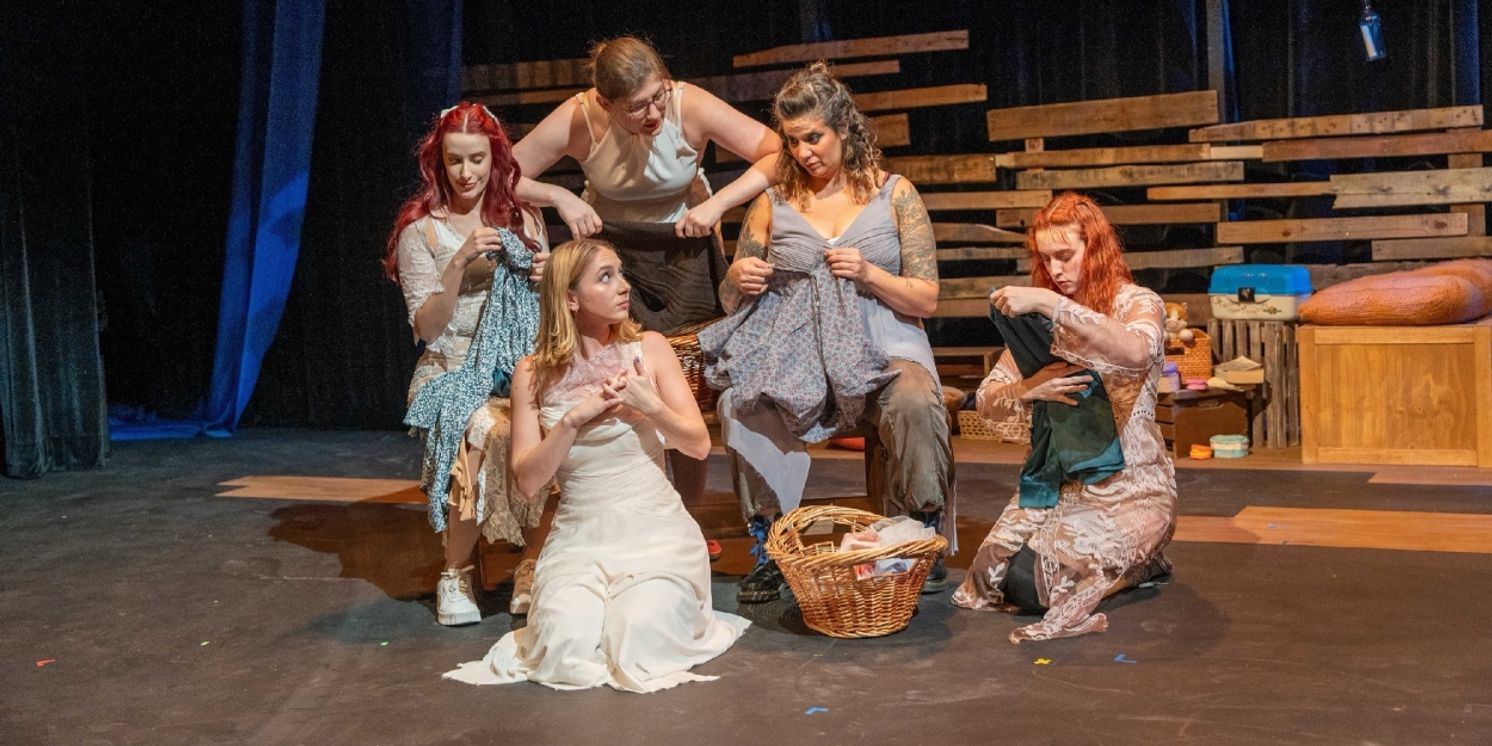Review: THE PLIANT GIRLS at Theatre Prometheus/Nu Sass
Greek drama through a modern lens, seriously darkly

The Pliant Girls has little in common with Euripides' The Suppliant Women except both plays employ the Greek theatre convention, a chorus. The five females in this cast of characters are each more woman than girl, and by the time the intermission-less, 95 minute play ends, they have each decided to not ever be pliant again. But playwright Meghan Brown takes a wearying, detour-filled route to a thematic destination that has been obvious for millennia and remains so despite the slings and arrows of outrageous males who keep constructing social and cultural obstacles to the self-evident fact that women are and of right ought to be as free and independent as men.
The Pliant Girls does share plot elements with Aeschylus' The Suppliants, which concerned a group of Greek women trying to avoid being forced into marriage. But because the play was the first in a trilogy of which the second two plays have been lost, Aeschylus' outcome is not fully known. Brown does pick up where Aeschylus left his Suppliants, using some elements of Greek mythology and extant fragments from which scholars have learned about the projected contents of the two missing plays. But the sexist-filled ethos that we here in the 21st century partially share with the 5th century BC just seems a little shopworn.
To torment her thesis, Brown places an equal number of demonstrably modern women and men on a mythical island in a very contemporary and familiar time period where the ladies maintain a charming sisterhood until it is "time" to be Picked, Courted, Married, Beggared. The rigidity and sameness of this societal construct threatens to destroy the women's individuality until they fashion an Ending which Euripides would surely recognize because he also wrote The Bacchae. It's neither a peace treaty nor a cease fire. Brown's play concludes with a plot twist that yields a still, small voice indicating that some men and women might could maybe sorta live together in equality, love, and mutual respect and support. Some. Everyone else is doomed, and, because it's 2024, Aphrodite cannot descend ex machina to restore order.
What Brown has done very well is create a matrix in which ten capable actors excel, indeed, often shine. Along with brief choral passages, there are duets and monologues, long scenes and short ones, big moments and small, quiet times. The variety refreshes. Director Ileana Blustein seems more orchestra conductor than director: the play has tempi, clear markings for speed and sound, and ensembles, solos, and changes of pitch, key, tone. So Blustein's musical awareness compensates for the political beating that the script gives an audience. Brown's well-crafted use of different dramatic tools provides ample material for the actors to bring to their characterizations. Emma Wesslund's Courtney must be a General. Max Johnson's Dean must be bitterly cruel. Alex Aspiazu's Kay can Big Sister and then self-denigrate. Madeline Marie's Philomena is a self-assured businesswoman one minute and the next, brittle and defensive. Seth Rosenke's Alexander, the kind of alcoholic who drinks himself comatose, must suddenly sober up and make the audience care about him. Elgin Martin's Marcus turns from genial gentleman to nasty schmuck. Caleigh Riordan Davis' Arianna often has panic attacks of various intensities and durations until Arianna accepts her identity and becomes strong and articulate. Philippos Sourvinos' sweet Claude has to wrangle Aspiazu's Kay and then express his own self-awareness. (Their game of "Never Have I Ever" makes for a few welcome, light-hearted moments.) Mollie Greenberg (Leta) and Jordan Brown (Kem) meet cute but then evolve into genuine partners. Shana Laski's choreography, for the women especially, helps visually mark the many shifts in the text. And so does Hailey Laroe's lighting design which effectively targets solo moments and always illuminates the right place at the right time. Simone Schneeberg's set design is spare but lovely--some ropes, some tiny lights, some flowing blue fabric--less is always more.
The trouble with The Pliant Girls is that playwright Brown's idea that the world's inability to excise sexism from its cultures is a zero-sum game. She's correct that it's terrible, but the solution offered by The Pliant Girls is equally terrible. The production--genuinely the opposite of terrible--is well acted and directed through November 9.
(Photo by Sarah Straub)
Reader Reviews
Videos

